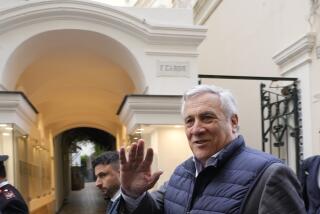G-7 Opts for Balancing Act on Currencies
- Share via
BOCA RATON, Fla. — Treasury Secretary John W. Snow and other rich-nation finance ministers attempted a delicate international balancing act Saturday, addressing European concerns about the euro’s rise against the weak U.S. dollar while doing little that would halt the greenback’s export-fueling, job-creating slide in this election year.
At a meeting of Group of 7 finance ministers in this palm-shaded resort, Snow pointed to the Bush administration’s professed “strong dollar policy” and joined his colleagues in condemning “excess volatility” in exchange rates. But the underlying message to financial markets was the opposite, as he urged Asian countries that had kept their currencies in step with the dollar to let them rise, which would push the dollar even lower.
The dollar has fallen 30% against the euro over the last two years and 20% against the Japanese yen, despite Tokyo’s intervention to protect its own export-driven recovery. Although international financial institutions warn that a weak dollar coupled with huge U.S. budget and trade deficits can wreak havoc on the world’s economies in the long run, the short-term consequences for Washington have been stronger growth and booming exports.
But the powerful euro means German luxury cars, Italian fashions and French-made aircraft are more expensive in the United States, their most important market, and many Europeans fear that a slump in exports will halt the continent’s fragile recovery.
Nonetheless, with President Bush’s approval ratings tumbling amid growing doubts that the United States had reliable intelligence to justify the invasion of Iraq, his reelection fortunes might hang on continuing improvement in employment and robust domestic growth. Relations between Washington and Europe are still touchy after last year’s bitter confrontation over the U.S.-led war in Iraq, a campaign that longtime allies France and Germany declined to take part in. The puny dollar threatens to add economic insult to political injury, prolonging frictions among the allies at a time when Washington needs their support to rebuild Iraq and keep the peace in Afghanistan.
Germany, France and Italy, the three euro-zone members of the industrialized nations known as the G-7, made it known before the meeting in Florida that they wanted to clear up confusion over the intent of the group’s communique at a September meeting in Dubai, United Arab Emirates. That communique said “more flexibility in exchange rates is desirable for major countries or economic areas to promote smooth and widespread adjustments in the international financial system” -- a position financial markets interpreted as a signal to sell dollars. The dollar’s tailspin accelerated, dropping 10% against the euro after that meeting.
After two days of talks behind closed doors, the G-7 issued a statement Saturday making clear that it meant it wanted Asian countries to loosen the reins on their currencies. It called for “more flexibility in ... areas that lack such flexibility,” referring to China, which pegs its yuan rate to the dollar, thereby piggybacking on the trade benefits and compounding the setbacks for Europe.
The euro floats freely against the dollar, and those versed in the financial lexicon will recognize that the call for flexibility is not directed at Europe. Afterward, German Finance Minister Hans Eichel intimated satisfaction with the reworded policy, saying, “The fact that we all agreed on this is very valuable, and financial markets will take this into account.”
In Dubai, an “agenda for growth” set specific economic restructuring targets for each country, and Saturday, Snow praised the group’s collective progress in tackling those reforms.
But the G-7 is in need of restructuring to reflect shifting economic balances throughout the world. Major national forces in the world economy, such as China, India and Brazil, are not members of the group. That gives the rich-country club -- comprising the United States, Canada, Britain, France, Germany, Italy and Japan -- little leverage with the outsiders to get them to make sacrifices for the global good.
Even Japan, which is a member, has ignored appeals that it let the yen rise against the dollar. The Bank of Japan last year sold five times as much yen -- $190 billion worth -- as in 2002 to protect Japanese exporters of cars, cameras and electronics.
South Korea also has been reluctant to stop weakening its won, having enjoyed more than 30% growth in exports last year. But South Korea, Thailand and Taiwan have plans to shed some of the region’s vast dollar holdings in U.S. government bonds that finance Washington’s debt.
Asian financing of U.S. debt enables the Federal Reserve to keep interest rates low, driving growth in the American economy. But Fed Chairman Alan Greenspan last month alluded to the precarious convergence of U.S. and Asian interests when he warned that “reliance on borrowed funds may not be sustainable.”
Asia’s affinity for dollars stems from its 1997 financial crisis, when central banks in the region lost double-digit billions of dollars defending their own currencies.
Since then, they have erred on the side of excess in keeping dollar reserves to buffer any unexpected shocks. But a constantly weakening dollar could at some point spur panic among those central banks with big reserves, instigating a destabilizing sell-off.
The dollar last week was butting up against its Jan. 12 record low of $1.29 to the euro, closing Friday at $1.27 on expectation that little would be done by the G-7 finance ministers to slow the dollar’s decline. Some analysts forecast a continued plummet this year to as low as $1.40 to the euro.
More to Read
Sign up for Essential California
The most important California stories and recommendations in your inbox every morning.
You may occasionally receive promotional content from the Los Angeles Times.











